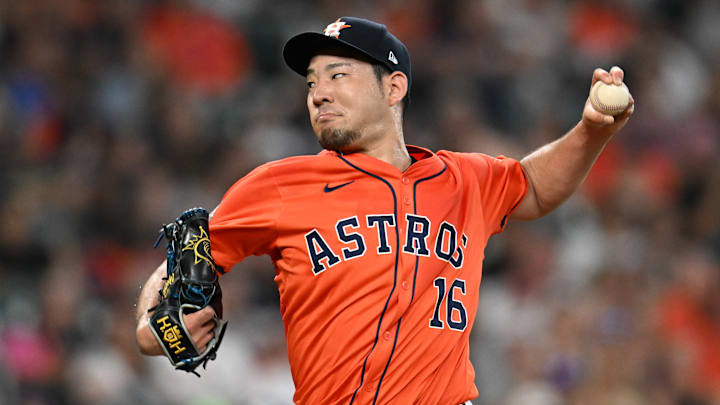By now, Houston Astros fans are well aware of the narrative around their trade for Yusei Kikuchi. While Kikuchi clearly has good stuff when he is on, most observers thought the trade was an overpay for a guy that who has largely been a 4.50 ERA starter and who is a free agent after the season. Time will tell how the prospects the Astros gave up turn out, but it was a heavy price to pay.
Right on cue, Kikuchi immediately took it to his doubters in his first start with Houston. Not only did Kikuchi exceed expectations with 11 strikeouts across 5.2 innings on Friday against the Rays, but he also tied a franchise record with eight consecutive strikeouts. If that was all there was to the story, that would be more than fine.
However, it is HOW Kikuchi racked up those strikeouts that is the most interesting part of the lefty's debut with the Astros. After the game, Kikuchi revealed an adjustment the Astros made with him, encouraging him to throw his changeup more. Assuming the results actually stick, that adjustment could completely change the outlook of Houston's trade.
Yusei Kikuchi's pivot to throwing more changeups could pay huge dividends for the Astros
A quick look at Kikuchi's Statcast page shows some obvious cause for concern. For several years now, he has given up a lot of hard contact, and opposing batters have been able to successfully hunt his curveball and fastball. His stuff has been good enough to keep the results reasonable, but the quality of contact he gives up on those pitches has limited his ceiling a great deal.
However, a closer look at Kikuchi's pitch data reveals something interesting that the Astros also clearly noticed. Since 2021, Kikuchi's changeup has actually graded out really well despite the fact that it was his fourth most used pitch during that period of time. Just this season alone, opposing hitters are hitting just .180 against his changeup with a .279 slugging percentage and a xwOBA of just .209. That is a big-time pitch.
A quality changeup opens up a lot of doors and could be particularly useful for Kikuchi. Previously, his curveball was his preferred "change of pace" pitch, but hitters were able to track it out of his hand well, which limits its effectiveness in disrupting hitters' timing. Assuming Kikuchi's changeup is actually this good and hitters don't easily adjust, it should lead to a lot more weak contact and should also make timing his mid-90s fastball much more challenging, thereby causing the pitch to play up.
At the end of the day, the Astros did still probably pay too much for Kikuchi. Even if Kikuchi is good, he is still a rental, and the Astros gave up one of their best young hitters in Joey Loperfido, along with Jake Bloss and Will Wagner, to land him.
However, Houston fans probably won't care nearly as much about how much he cost if he can keep shoving the rest of the season.
